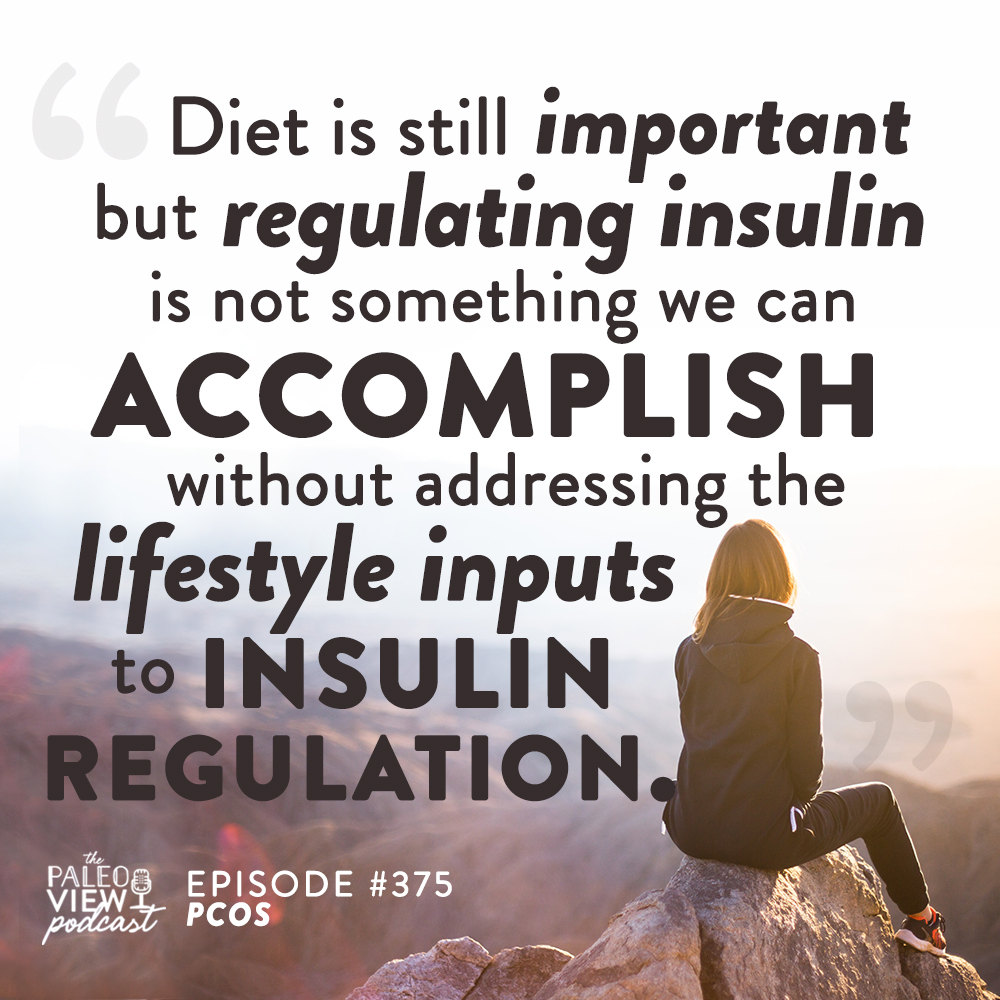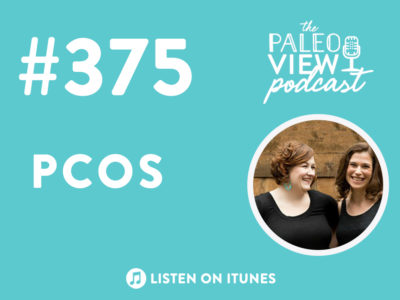On this week’s episode, Sarah and Stacy address a listener’s question about the role that a low carb diet can play on PCOS. Can dietary tweaks and adjustments help with PCOS symptoms? Do lifestyle factors play a role? All of this and more in episode 375. Enjoy!
If you enjoy the show, please review it on iTunes!
The Paleo View (TPV), Episode 375: PCOS
Welcome back to The Paleo View – episode 375. (0:40)
If you haven’t yet heard about why Stacy and Sarah love this tool, check out this podcast episode that covers all the benefits of red light therapy.
This week’s episode was inspired by a question from Molli on the topic of PCOS.
First, before Sarah dives in, Stacy wanted to give a shoutout to Molli who is an active and engaged follower on social media.
Stacy wants to also encourage other listeners to use these channels as a way to submit questions.
Molli’s Question
Molli aks: I was recently diagnosed with PCOS and have been told I need to adapt to a low carb diet due to insulin resistance. (4:44)
However, with the research you guys have presented about the benefits of healthy carbs for the gut microbiome I’m not sure what the best route is to take.
Is there is any research on other things I can do to help my body regulate its cycles and begin to ovulate?
There is just so much information out there about PCOS it’s hard to know what is accurate, and I trust your insights!
Save 70% Off the AIP Lecture Series!
Learn everything you need to know about the Autoimmune Protocol to regain your health!
I am loving this AIP course and all the information I am receiving. The amount of work you have put into this is amazing and greatly, GREATLY, appreciated. Thank you so much. Taking this course gives me the knowledge I need to understand why my body is doing what it is doing and reinforces my determination to continue along this dietary path to heal it. Invaluable!
Carmen Maier

First, Stacy wants to note that hormone regulation, in general, has been covered on this show a lot in different lifestyle aspects.
So when it comes to things like sleep, stress, sunlight, movement, hormone-disrupting products from your life, be mindful of how all these aspects impact hormone regulation.
Molli, if the only thing a doctor is telling you is to go low-carb you might want to look around for another doctor who can help with the lifestyle suggestions.
Things like meditation, red light therapy, and yoga can have a lot of benefits as well.
About PCOS
PCOS is incredibly common.
There are estimates that up to 6 to 10% of women of reproductive age have PCOS.
It is a condition that is considered a genetic condition that is triggered and worsened by weight gain and insulin resistance.
PCOS triggers a vicious cycle because the insulin resistance and weight gain exaggerate the excess hormones that are being produced.
The excess hormones make it really hard to lose weight, and gaining weight and having more insulin resistance skews the hormones.
One thing Sarah wanted to note is that you don’t have to be overweight to be insulin resistant.
So this essentially means that PCOS has two key features.
The key features are insulin resistance and hyperandrogenism.
These two features are what drive the various symptoms.
So the symptoms fall into a few different categories.
The main ones are menstrual cycle symptoms, infertility, inappropriate male features, skin issues, weight regulation challenges, and mental health issues.
Different women experience symptoms of PCOS differently.
Just in the last few years, PCOS has been recognized as a genetic condition. (15:34)
PCOS is similar to autoimmune disease in the sense that there is a collection of risk genes, but it requires an environmental trigger to be turned on.
It is the combination of these genetic risk genes with insulin resistance or weight gain that starts this vicious cycle.
And once you are in this vicious cycle it can be very hard to step out of it.
The Larger Impacts of PCOS
Having PCOS increases the risk of metabolic syndrome, developing type-2 diabetes, having high cholesterol that leads to cardiovascular disease, developing non-alcoholic fatty liver disease, and an increased risk of obstructed sleep apnea.
The root things that are going on in PCOS are also causing these other conditions to develop.
However, these conditions develop over a longer time scale.
Sarah noted that you will often see type-2 diabetes diagnosis and PCOS diagnosis go hand in hand.
Stacy noted that she feels like there is a lot of shame around conditions that can be contributed to obesity.
As a reminder, there are women who are not overweight who have PCOS.
There are a variety of health conditions that come whether or not you are overweight.
When we assign shame or guilt or negativity with a health condition it doesn’t help solve the problem.
There have been a variety of studies showing that if you can address your insulin sensitivity and blood sugar regulation, it can help reduce the hormones.
It has been confirmed through scientific evidence that obesity is not directly tied to what your insulin is doing, and low-carb diets do not provide any specific benefit to weight loss beyond calorie reduction.
However, there is still this aspect to diet culture that the way to lose weight is low carb. (23:39)
So if you have diabetes there is an assumption that the solution is low carb.
Sarah wants to refer listeners back to the insulin podcast episode.
As covered in that episode, there are many different effects that insulin has on the body that are not related to glucose metabolism.
It is probably more important to dial in lifestyle factors when it comes to restoring insulin sensitivity and reversing insulin resistance.
Diets & PCOS
Keto studies are using under 30 to 50 grams of carbohydrates for their measurements.
Low carb studies are using 50 to 150 grams of carbohydrates for their measurements.
There have also been studies that have looked at the Mediterranean diet, adding in protein, supplementing with fiber, using olive oil and more.
There was a meta-analysis that found 28 studies that were diet interventions for PCOS.
They said that there were 22 of those studies had such poor study design that they could not be included, which is incredibly unusual.
For the meta-analysis, they were able to pull the 6 studies and collect valuable data.
They found that there were subtle differences between the different intervention diets.
The style of diets that were observed were a Mediterranean style, low glycemic index, high and low carb diets, and a high protein diet.
They were able to show that the Mediterranean style diet resulted in greater weight loss.
There was improved menstrual regularity with a low glycemic index diet.
The free androgen index was best under a high carb diet.
Insulin resistance was better improved under both low carb and low glycemic index diet.
The best quality of life scores came from a low glycemic index diet.
Mental health scores were best improved with high protein diets.
Basically, all of the different dietary interventions that were tested in rigorous well-designed studies showed benefits to some piece of PCOS.
When women lost weight, all the different things going on with PCOS were improved.
If they didn’t lose as much weight, there wasn’t as much improvement.
This is a really important thing because it de-emphasizes the importance of insulin resistance compared to weight loss.
In these studies, they showed that normalizing weight is more powerful than what the actually dietary composition is.
It is far more important to eat a healthy diet than it is to manipulate macros to achieve some kind of magic insulin level.
The Role of Keto on PCOS
There has been one study that tested keto for PCOS. (39:00)
Sarah doesn’t actually recommend keto to anyone outside of its therapeutic use in two situations.
The study was published in 2005, no follow-up studies have ever been published.
It recruited 11 women, 6 of them dropped out of the study.
This is fairly predictable in a Keto study because of the way this diet impacts the quality of life.
To read more about these impacts, check out this post from Sarah’s site.
Keto is a diet that overtly manipulates sex hormones because of its role in what insulin is doing and not to the benefit of most people.
Red Light Therapy & Infrared Light Therapy
One of the benefits of red and infrared light therapy is that it increases ATP production in our cells.
This improvement with our cellular health has a lot of downstream effects.
It has actually been used in fertility studies.
There was a study that came out of Japan with a little over 300 women in the study who all failed out of IVF treatments due to infertility issues.
The study found that just by doing the infrared light therapy, about 20% of the women got pregnant.
Sarah noted that this is by no means a magic cure-all.
There was still a fairly high miscarriage rate in this study; upwards of 50%.
There have been more mechanistic studies done in animals with red and infrared wavelengths showing that shows improvement in infertility.
Sarah finds it very cool to see this information.
The studies behind this show the impact of improving cellular health and how that can translate to regulating hormones and improving ovary health.
Again, this isn’t being presented as a cure-all, but this is exciting research.
No one has done a study combining a nutrient-dense diet with lifestyle factors, throwing in some red light, and seeing what the formula produces.
Coming Full Circle
There is no compelling reason to be doing a low carb or ketogenic diet for regulating hormones or reducing insulin resistance in PCOS. (46:31)
The scientific study, when you look at it as a whole, points to a healthy diet is the way to go and that lifestyle is really important.
Sarah noted that there is some interesting science showing that insulin sensitivity is far more closely tied to our lifestyle factors than anything having to do with our diet.
She also feels like this isn’t adequately addressed in doctors’ offices.
Sarah shared more on the findings from various lifestyle factor studies.
We know that stress by itself can cause hormonal dysregulation, which can look a lot like PCOS.
There are multiple direct lines that point from lifestyle factors to PCOS.
Diet is still important, but regulating insulin is not something we can accomplish without addressing the lifestyle inputs to insulin regulation.
Addressing the lifestyle inputs is actually going to give us a much better bang for our buck than anything having to do with diet.
Stacy noted that Molli was spot on in identifying and knowing that gut health ties into this.
Shout out to Molli for understanding and following her instincts on this one.
As Stacy said, she would seek out someone who has a more well-rounded understanding of how these lifestyle factors will also play in.
There are medical professionals out there who can guide you, and Stacy highly recommends it based on how she has seen these lifestyle factors impact her friend’s health and symptoms around PCOS.
This is a more common health condition than most people realize.
Molli’s question was triggered by this recent podcast episode. (55:47)
Reminder, we need to be careful not to go too low carb.
There is still a compelling reason to be adopting a nutrient-focused Paleo diet with PCOS, which is a balanced macros.
This is because this is an optimal diet for the gut microbiome.
We are on the cusp of understanding PCOS and its link to our environment in much more detail.
However, there is enough information there to put together a comprehensive and holistic template that would include a nutrient focused diet.
To also dial in stress, sleep and activity, and incorporating a functional medicine practitioner.
Thanks for listening, and please keep those questions coming.
As always, Stacy and Sarah always appreciate your reviews, as well as your shares with friends and family.
Stacy and Sarah will be back again next week! (1:05:09)










